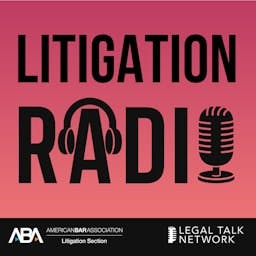Listen "When It’s Time to “Fire” a Client, Protect Yourself"
Episode Synopsis
What happens when your relationship with a client sours? When, and how, can you fire a client? And how can you avoid getting to that point? Guest Michael LeBoff is a veteran litigator who has worked with a variety of clients over his 25-year career.
LeBoff explains that client issues are, in most case, simply a matter of communication, payment, or a client’s frustration with the legal system. The system is complicated, cases take time, and costs may surprise unprepared clients. A lot of this is about managing client expectations. For instance, if a case is held up in a court calendar, communicate to your client that you’re still on the case and let them know what’s going on.
But despite all efforts, sometimes things simply don’t work out and you may need to fire a client. It could be over slow payments or because a client has pushed you to behave unethically. Withdrawing from a case has its complications, ethical considerations, and Bar requirements. In these situations, it helps if you’ve documented everything in writing. That includes your strategy, desired outcomes, and costs.
Listen to this episode for best practices, how to protect yourself, and how to avoid minefields.
RESOURCES:
ABA Rule 1.16: Declining or Terminating Representation
American Bar Association
American Bar Association Litigation Section
LeBoff explains that client issues are, in most case, simply a matter of communication, payment, or a client’s frustration with the legal system. The system is complicated, cases take time, and costs may surprise unprepared clients. A lot of this is about managing client expectations. For instance, if a case is held up in a court calendar, communicate to your client that you’re still on the case and let them know what’s going on.
But despite all efforts, sometimes things simply don’t work out and you may need to fire a client. It could be over slow payments or because a client has pushed you to behave unethically. Withdrawing from a case has its complications, ethical considerations, and Bar requirements. In these situations, it helps if you’ve documented everything in writing. That includes your strategy, desired outcomes, and costs.
Listen to this episode for best practices, how to protect yourself, and how to avoid minefields.
RESOURCES:
ABA Rule 1.16: Declining or Terminating Representation
American Bar Association
American Bar Association Litigation Section
More episodes of the podcast Litigation Radio
Strategies for Mindful Business Development.
02/12/2025
The Winding Road to Your Future
04/11/2025
How to Retain Your Associates
23/09/2025
Expert Timing: When to Retain Your Expert
26/08/2025
Pro Tips for Arbitrations and Mediations
01/07/2025
The Explosion of E-Discovery
10/06/2025
 ZARZA We are Zarza, the prestigious firm behind major projects in information technology.
ZARZA We are Zarza, the prestigious firm behind major projects in information technology.
